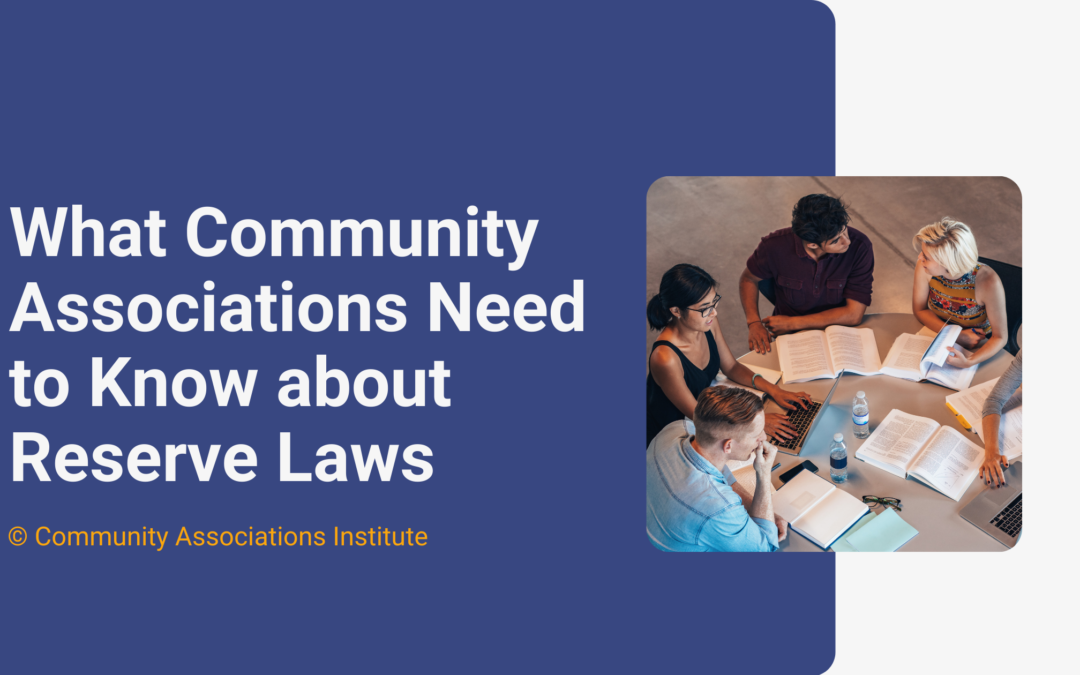Following last month’s devastating partial collapse of the Champlain Tower South condominium in Surfside, Fla., many community association managers, boards, and residents are eager to understand state laws and regulations around reserve studies and reserve funding.
A reserve study is a budget planning tool—consisting of both a physical and financial analysis—that identifies the components an association must maintain or replace, the current status of the reserve fund, and a stable and equitable funding plan to offset anticipated major common area expenditures, according to the Foundation for Community Association Research’s Best Practices report on reserve studies and reserves management.
CAI’s Government and Public Affairs Committee recently convened a special meeting with experts representing attorneys, builders, reserve specialists, and insurance professionals to discuss best practices, standards, and public policies related to the tragedy in Surfside. Three working groups have convened to establish guidance and model language for CAI’s state legislative action committees as well as considerations for state legislators and best practices for community association board members, managers, and other professionals.
The three working groups are:
- Building inspections and maintenance.
- Reserve study planning and funding.
- Insurance and risk management.
CAI advocates for developers to transition communities with a current reserve study and a budget that includes both operational funds and reserves, as well as initial funding of reserves for future maintenance, repair, and replacement of facilities and equipment.
Many states have legislation pertaining to community association reserves and operating funds to protect owners from fiscal concerns and financial hardship. Below is a summary of state reserve fund laws.
Reserve studies or a reserve schedule for condominium associations are required in California, Colorado, Delaware, Hawaii, Nevada, Oregon, Utah, Virginia, and Washington state. Washington statutorily encourages associations to have a reserve study performed every three years unless doing so would impose an unreasonable hardship. Florida statute does not require a reserve study but requires a reserve schedule for repair and replacement of major components.
Reserve funding for condominium associations is required in Connecticut, Delaware, Florida, Hawaii, Illinois, Massachusetts, Michigan, Minnesota, Nevada, Ohio, and Oregon.
Budget disclosure of reserve planning is required for condominium associations in Alabama, Alaska, Arizona, California, Connecticut, Delaware, the District of Columbia, Florida, Georgia, Hawaii, Illinois, Kentucky, Louisiana, Maine, Maryland, Michigan, Minnesota, Missouri, Nebraska, Nevada, New Hampshire, New Mexico, North Carolina, Oregon, Pennsylvania, Rhode Island, Texas, Utah, Vermont, Virginia, Washington, West Virginia, and Wisconsin.
Resale disclosures are required for condominium associations in Alabama, Arizona, California, Connecticut, Delaware, the District of Columbia, Florida, Georgia, Hawaii, Illinois, Louisiana, Maine, Maryland, Minnesota, Missouri, Nebraska, Nevada, New Hampshire, New Mexico, North Carolina, Pennsylvania, Rhode Island, South Carolina, Texas, Utah, Vermont, Virginia, Washington, West Virginia, and Wisconsin.
CAI is uniquely positioned to lead the conversation on these standards, best practices, and policy changes to benefit our more than 42,000 members, the 73.5 million Americans living in community associations, and the millions more living in community associations around the world. We will continue to engage in conversations with members, experts, and stakeholders in the community association housing model to strengthen existing standards and public policy in these areas.
If you have comments, opinions, or expertise in any of these areas and would like to contribute to the conversation, please email government@caionline.org.
Access additional CAI resources on reserve requirements and funding here.
Please remember that community associations are governed by state law, which can vary widely from state to state. This information is intended for general educational and informational purposes only; it may not reflect the most recent developments, and it may contain errors or omissions. The publisher does not warrant or guarantee that the information contained here complies with applicable law in any given state. It is not intended to be a substitute for advice from a lawyer, community manager, accountant, insurance agent, reserve professional, lender, or any other professional.



